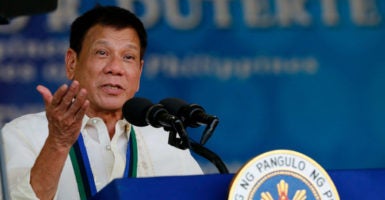It was a crazy election. One of the candidates for president threw around wildly irresponsible ideas, perhaps for entertainment value, perhaps because he really meant them. He offended many of his countrymen, and generated angst among the country’s closest friends and allies.
No one knows what vile thing the former mayor of Davao City, Rodrigo Duterte, will say, or what radical policy changes he will propose next. But now that he has assumed the presidency of the Philippines, everything he says assumes a new level of importance. Washington should put a hold on the recent expansion of its security ties with Manila until it gets a better sense of what Duterte means for the Philippines and American interests in the region.
The election season was bad enough. Duterte cursed the pope. He promised that if elected president, he would repeat the human rights abuses that, as mayor, earned him the nickname “The Punisher.” Uttering one of the most reprehensible things any candidate for higher office has said publicly anywhere in the world, Duterte lamented the rape of an Australian missionary in 1989. The pity, he said, was that he, the mayor, was not among her attackers.
Duterte continued in this unpredictable, offensive way after his election. Moreover, as president-elect he began to touch on matters directly related to the alliance with the U.S. He suggested canceling the Philippines military modernization program, and implied that if the U.S. cannot commit to coming to the aid of the Philippines in defense of its claims in the South China Sea, he will cut a deal with China.
Much of this, of course, is solely the business of the Philippines. If the Filipino people want an admitted philanderer who calls the Philippines’ bishops “sons of whores” and openly expresses admiration for rapists, that’s their business. If they think spending money on their external defense is a “waste of money,” and that they’d be better served reprising the failed efforts of previous Filipino presidents to compromise with Beijing, that is their call.
Washington, however, should pause to take stock of how a Duterte administration—if it lives up to its rhetoric—should impact its own side of the relationship. An extraordinary amount of progress has been made over the last several years in U.S.-Philippines relations: increased American security assistance, strengthened treaty commitments, the new Enhanced Defense Cooperation Agreement, and identification of five bases that the U.S. will help upgrade and then use to train and rotate through.
This progress has been predicated on continuity and predictability, and shared interests. If the Philippines is poised to take a radical new direction, both in terms of governance and strategic priorities, Washington should know.
Now, if Duterte is who he says he is, some of this will take care of itself.
Take U.S. government assistance, for instance. Friends of the Philippines in Washington have long opposed human rights-focused efforts to curtail American assistance to the Philippines. They have done so by pointing to Manila’s own commitment to addressing problems like extrajudicial killings. Now, with a president who vows to double down on abuse, the gloves in the American Congress will be off and advocates of the alliance disarmed.
In his inaugural address in June, Duterte made noises about his commitment to the rule of law. But he also said the following with regard to his pledge to fight crime:
In this fight, I ask Congress and the Commission on Human Rights and all others who are similarly situated to allow us a level of governance that is consistent to our mandate. The fight will be relentless and it will be sustained.
It has an ominous sound to it that will not be lost on the U.S. Congress.
Reaction in other areas of U.S.-Philippines relations is similarly predictable. Take defense spending. Duterte should understand that in the absence of at least a minimal effort on the part of the Philippines to provide for its own external defense, it is inconceivable that the U.S. would defend it from Chinese advances. This is not the Cold War. The stakes in the American struggle with the Soviet Union were global and all-encompassing. Conflicting U.S.-China interests are much narrower. The U.S.-Philippines alliance has the potential to serve these interests. But, let’s be clear: the U.S. has options for serving them much more palatable than defending a country not willing to defend itself.
It is true, as Duterte and other Filipino commentators have warned, that the U.S. obligations under its 1951 treaty with the Philippines are not automatic. They are not automatic in any of our Pacific treaties, not with Japan, or South Korea, or Australia, or Thailand. All are dependent on the U.S. president adhering to U.S. constitutional processes—as they should be.
It is also true that the American reading of the treaty excludes defense of disputed land features in the South China Sea. But again, this is for good reason. Chinese historical claims so far from its shores may be ridiculous, but the Philippines’ claims are themselves far from watertight. Even so, some have argued for a calculated ambiguity designed to deter Chinese moves on disputed territory and extension of U.S. treaty commitments to areas—like the Kalayaan islands—that are actually under the effective jurisdiction of the Philippines. But it is under no obligation to do so and now well-advised not to until Washington gets a better understanding of Duterte’s intentions.
Duterte will not destroy the U.S.-Philippines relationship: the ties between our countries are strong. They go well beyond military-to-military engagement and the South China Sea. Whether the security of the Philippines will weather as well in the absence of U.S. security commitments and assistance is a different question. And it is one that the U.S. needs Duterte’s answer to first. Until it has it, Washington ought to take a timeout.





























